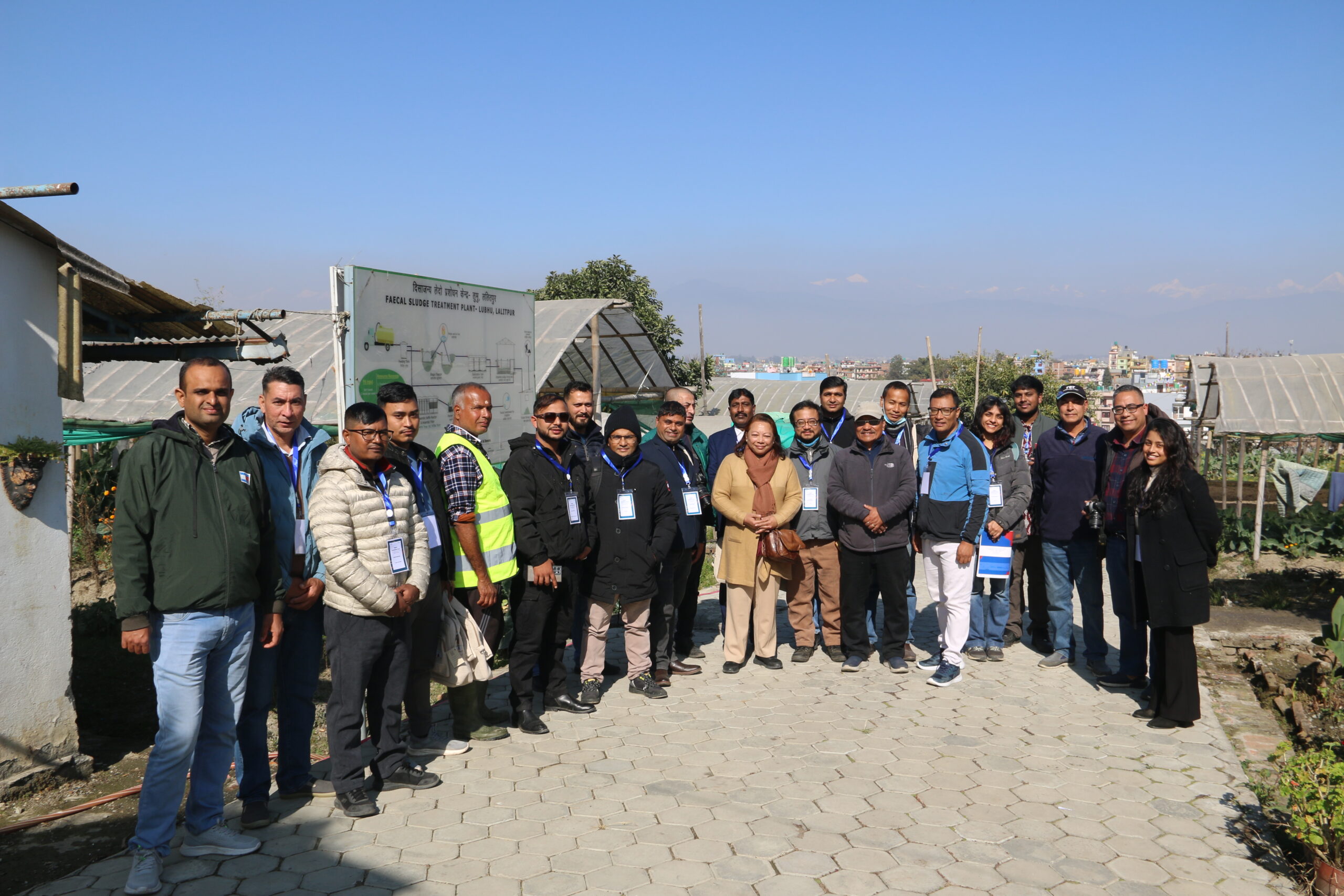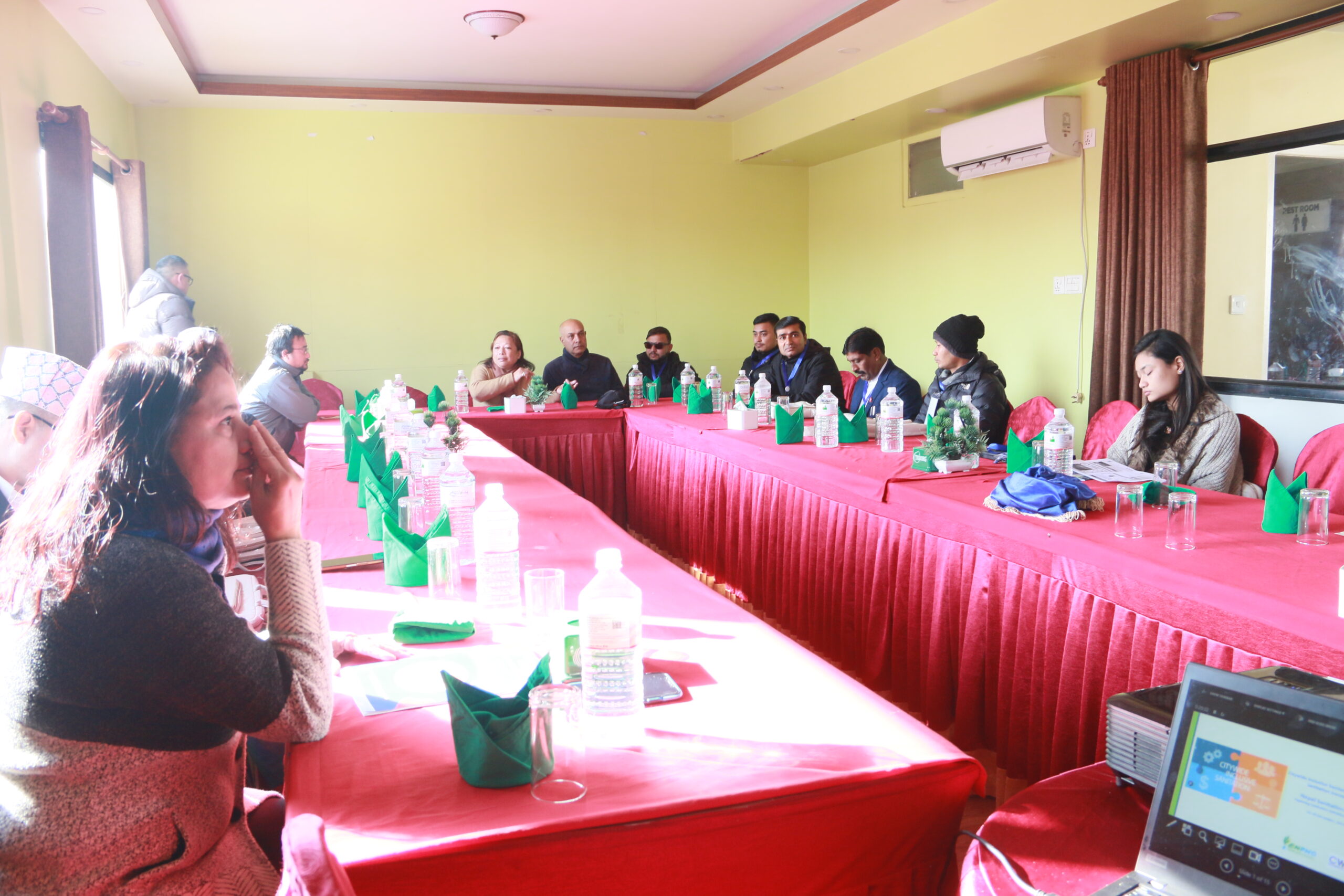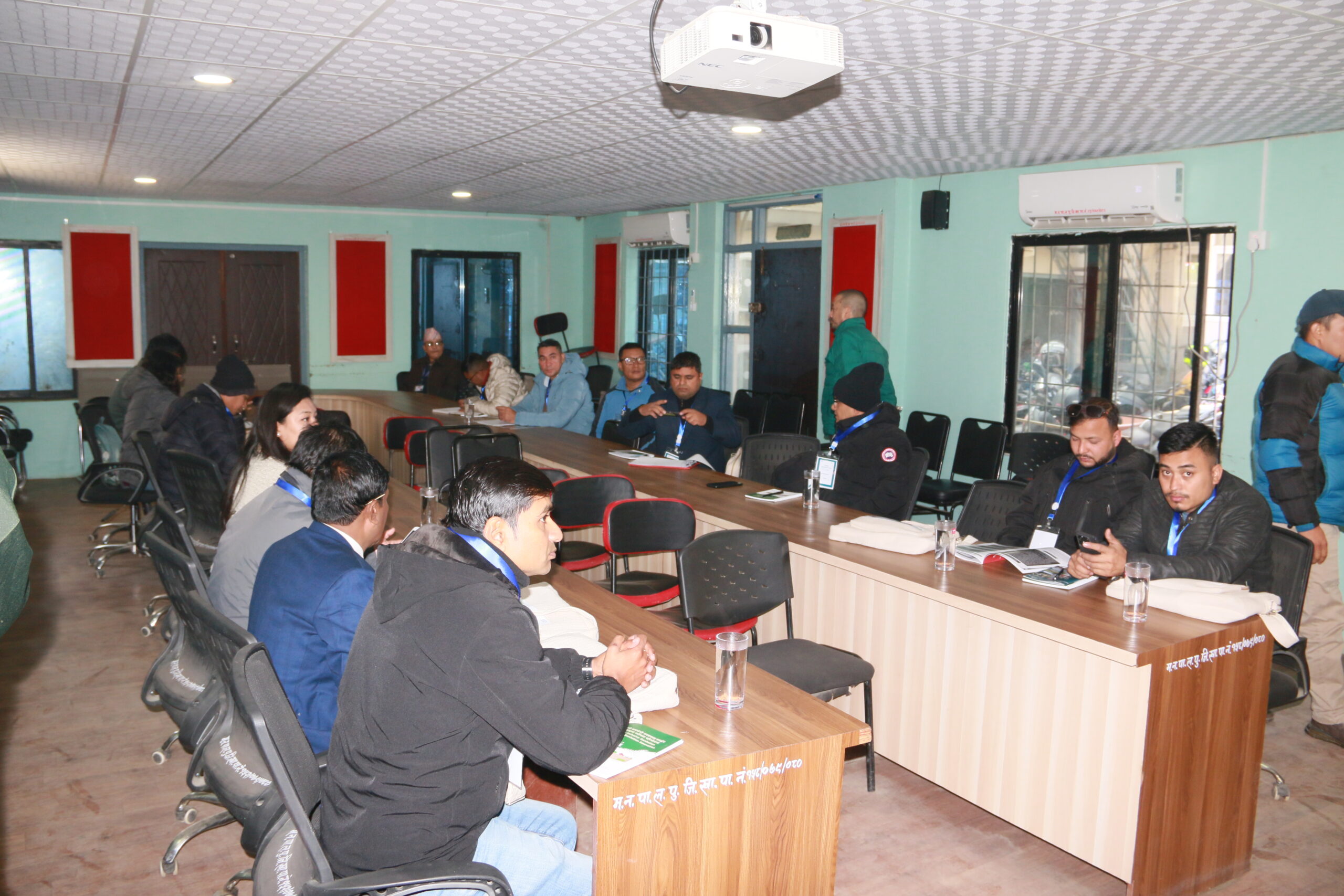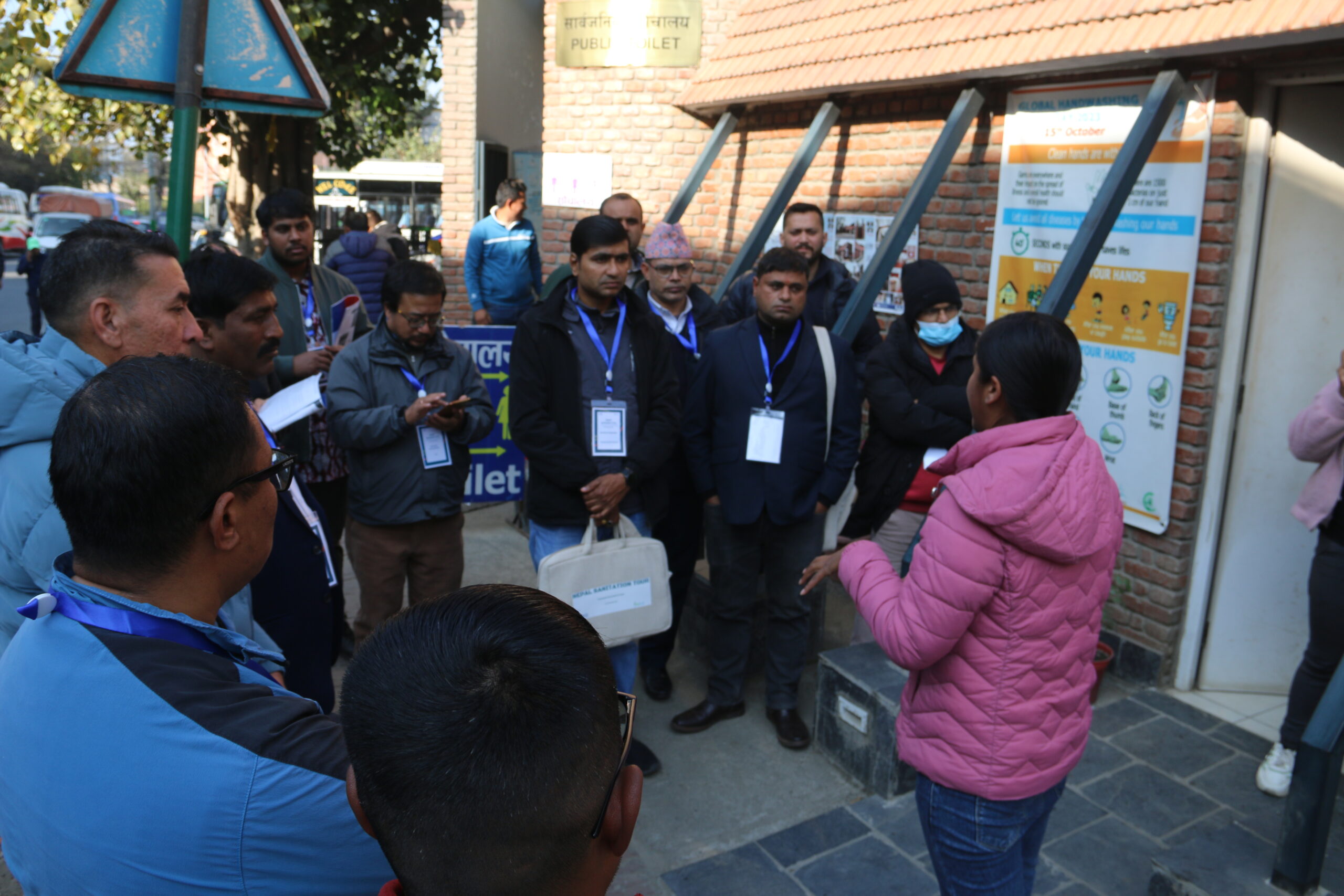Unveiling Sanitation Initiatives: Key Insights from Nepal’s 2024 Tour
Nepal’s sanitation journey has been marked by remarkable strides toward innovation, inclusivity, and sustainability. To provide firsthand experiences of sanitation practices and foster collaboration, ENPHO, in collaboration with the CWIS Alliance Nepal, organized the Nepal Sanitation Tour 2024 from December 16–20. This initiative highlights successful sanitation initiatives across Nepal, offering participants an in-depth exploration of diverse technologies and practices while enabling meaningful interactions with stakeholders. The five-day tour provides insights into effective sanitation strategies through site visits, demonstrations, and discussions, thereby enriching participants’ theoretical understanding and empowering them to implement relevant strategies in diverse contexts. It also facilitated collaboration and networking, connecting participants with experts, practitioners, and organizations dedicated to transformative change.

Participants of Nepal Sanitation Tour 2024
Diverse Representation at the Sanitation Tour
The five-day tour brought together 18 representatives from municipalities, development partners, and private organizations, including Tikapur Municipality, Panchakhapan Municipality, Mahalaxmi Municipality, CIUD, WHH, Washkhabar, Best Paani, Valley Clean Nepal, and Dasra India. Participants delved into sanitation strategies through site visits, demonstrations, and discussions, enriching their theoretical knowledge and fostering collaboration among stakeholders.
Day 1: Meet and greet, and Exploring Mahalaxmi Municipality

Interaction with Mahalaxmi Municipality
The tour kicked off with a Meet and Greet session, where participants were welcomed by Bhawana Sharma, Executive Director of ENPHO, and representatives from the CWIS Alliance, including Sudha Shrestha (National Professional Officer) and other key figures like Sanjaya Adhikary Consultant with CWISAN/UN-Habitat. Rajesh Manandhar Project Manager, UN-Habitat, and Satish Jung Shahi (CWISAN Coordinator). The session began with introductions, followed by a presentation outlining the objectives of the Nepal Sanitation Tour. Mr. Ash Kumar Khaitu, the Program Manager of ENPHO, warmly welcomed all delegates to the event. Mr. Khaitu outlined the schedule for the five-day event, providing an overview of the activities and sessions, and helping participants set expectations for the program.
Ms. Bhawana Sharma, ENPHO’s Executive Director, then welcomed the participants, emphasizing that the tour was a collective effort aimed at learning, sharing, and collaborating to promote more inclusive and sustainable sanitation solutions. Over the next five days, participants will explore innovative practices that highlight the value of partnerships and commitment to driving meaningful change.
Sudha Shrestha, the National Professional Officer from CWISAN, also welcomed the participants, stressing the importance of the tour in fostering collaboration and knowledge-sharing. She expressed excitement about exploring innovative sanitation solutions and encouraged everyone to engage fully, learn from each other, and take valuable insights back to their respective roles and communities.

Interaction with Mahalaxmi Municipality
The first field visit was to Mahalaxmi Municipality, a mentor city. Mr. Rabindra Upreti, sanitation head, presented an in-depth overview of the municipality’s journey to becoming a mentor city. His presentation highlighted the significant sanitation initiatives undertaken by the municipality, the various challenges encountered, and the remarkable achievements they have accomplished. Mr. Upreti also detailed the implementation of a Geographic Information System (GIS)-based sanitation app, which is utilized to track household toilets and septic tanks, ensuring accurate and up-to-date records. Additionally, he introduced the Integrated Municipal Information System (IMIS), a tool that provides real-time data availability, enhancing the efficiency and responsiveness of sanitation services. He further discussed the standardization of septic tanks, a critical step in improving sanitation infrastructure, and the various capacity-building initiatives aimed at enhancing the skills and knowledge of local sanitation workers. Another notable achievement highlighted was the revival of the Lubhu FSTP, an essential facility for effective faecal sludge management in the municipality.

Insights into FSTP Lubhu
The group explored the Lubhu FSTP, which serves as a demonstration site for small-scale faecal sludge management. Mr. Sunil Krishna Shrestha, Secretariat of Help for Children, provided an overview of the FSTP’s operations, while the plant operator, Mr. Surya Prasad Ghimire, described the treatment process and the beneficial uses of by-products such as biogas, treated water, and compost. Additionally, Engineer Debendra Shrestha from ENPHO elaborated on the step-by-step treatment process, which includes waste transportation, biogas digestion, gravel filtration, and regular water quality testing, ensuring the facility’s efficient and sustainable operation.

Visit to Aerosan Public Toilet, Patan
Later, the team visited the Aerosan Public Toilet, a standout example of a public-private partnership (PPP) model in sanitation. Ms. Archana Shrestha, Program Manager of Aerosan Hub, guided the participants, explaining the facility’s components. This public toilet is recognized for its user-friendly design, especially for women, and its sustainable community service model. It combines financial viability with environmental stewardship, inspiring participants to consider replicating such features in their municipalities for developing smart public toilets.

Insights into Guheswori Wastewater Treatment Plant
The last site of the day was dedicated to an insightful tour of the Guheshwori wastewater treatment plant, the only large-scale facility of its kind in Kathmandu. The visit aimed at providing the delegates with a comprehensive understanding of the plant’s operation, including detailed information about its various components and systems. The tour emphasized the importance of large-scale wastewater management in urban settings, showcasing the plant’s capabilities in handling and treating large volumes of wastewater to protect public health and the environment. During the visit, Engineer Pravat K.C. delivered a brief presentation on the operation and functionality of the Guheshwori wastewater treatment plant. He highlighted several key aspects including treatment process, technological components, capacity and coverage, environmental benefits along with challenges and innovation.
Day 2: Innovations in Butwal

Insights into Butwal Sanitary Pvt. Ltd, Butwal
A group of 18 participants visited Butwal Sanitary, a faecal sludge treatment facility established and operated by the private sector. The team was warmly welcomed by the owners, who shared insights into their journey of venturing into the sanitation business. They highlighted key sanitation initiatives, challenges encountered, and strategies employed to sustain the business. Participants were provided with practical knowledge about the facility’s operations, including detailed information on the various components of the treatment system. The team was particularly impressed by the private sector’s commitment and successful investment in running a sanitation business.

Visit to Murgiya Water and Sanitation Committee, Butwal
Following this, the team visited the Murgiya Water and Sanitation Committee, a facility that treats wastewater from around 450 households. Prem Bahadur Baniya, President of the Murgiya Water and Sanitation Committee, provided an insightful tour of the facility. He detailed the project’s components, operational processes, and the collaborative efforts that ensure its effective functioning. Participants gained a comprehensive understanding of how the project manages wastewater efficiently, demonstrating its importance as a model for community-driven sanitation solutions.
Day 3: Mentor City Visit – Waling Municipality

Meet & Greet with Waling Municipality
On the third day, the team visited Waling Municipality, where a formal welcome program was held. The Deputy Mayor Ms. Kabita Gaire Tiwari extended a warm welcome and shared the city’s journey toward becoming a mentor city, highlighting key initiatives and accomplishments. After the welcome session, the team was taken to the Waling FSTP, where they enjoyed lunch on-site. Following the meal, the team toured the facility, with Mr. Dhurba Regmi, the sanitation focal person, providing an in-depth explanation of the FSTP’s operational model. He discussed the plant’s role in solid waste management, its treatment processes, and how by-products such as treated water and compost are utilized. Mr. Regmi also offered technical insights into the treatment process, enriching the team’s understanding of its functioning.

Insights into FSTP, Waling
Day 4: Wastewater Management at a 4-Star Hotel

Visit to Waterfront Resort, Pokhara
The final stop on the sanitation tour was the Waterfront Resort at Sedi Heights, Lakeside Road, Pokhara, where the team explored the resort’s innovative approach to wastewater management. The team discovered that the resort employs a Decentralized Wastewater Treatment System (DEWATS) to handle both black water (toilet waste) and grey water (kitchen and laundry waste) on-site. This visit highlighted the significance of incorporating wastewater management into facility planning and demonstrated how decentralized systems can promote environmental sustainability, even in high-demand locations like resorts. The team gained valuable insights into the system’s functionality, operational costs, and workforce requirements, providing a potential model for other facilities aiming to implement sustainable water management practices.
Reflection Session:

After completing the site visits, the team participated in a one-hour reflection session. During this session, the concept of CWIS was introduced to the group, providing them with a deeper understanding of the importance of inclusive and sustainable sanitation practices. The participants were then divided into three groups: municipality group, private sector group, and development partners group. Each group was tasked with reflecting on the key lessons they learned from the tour, framed through the perspective of their respective roles whether as a municipality, private sector, or development partner.
At the end of the session, participants were provided with a commitment sheet, encouraging them to outline actionable steps they intended to implement in their respective municipalities based on the knowledge and insights gained. Many participants assured to share their learnings within their municipalities and initiate awareness campaigns in various wards to promote better sanitation practices.
Municipal representatives from areas with non-functional FSTPs committed to taking swift action, in coordination with the municipal executive board, to restore their operations. They also emphasized the importance of ensuring quarterly water quality testing for drinking water supplied to communities.
The private sector expressed their intent to raise awareness among the public about effective wastewater treatment methods and proper septic tank construction practices. Development partners committed to disseminating the learnings from the sanitation tour within their organizations, sharing experiences, and conducting training sessions focused on Solid Waste Management (SWM), Faecal Sludge Management (FSM), and City-Wide Inclusive Sanitation (CWIS).
Each participant signed the commitment sheet, symbolizing their dedication to applying these insights and contributing to improved sanitation efforts in their communities. This reflection session underscored the collective responsibility and enthusiasm of stakeholders to drive meaningful change in sanitation practices.
Voices from the participants
“The sanitation tour was an enriching experience, giving me insights into waste management across different scales from small entrepreneurs to large municipal systems. It helped me understand the complexity of these systems and the challenges in managing them sustainably. I’m now inspired to research and design sustainable, eco-friendly solutions for FSTPs and SWM.”
Shyam Chaudhary Technical Officer WHH
“Dasra India greatly values the opportunity to participate in the Nepal Sanitation Tour. This experience provided valuable insights into the innovative approaches to fecal sludge management and city-wide inclusive sanitation.”
Shreya Sharma WASH Analyst Dasra, India





